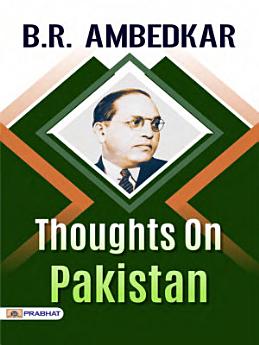Thoughts On Pakistan: Thoughts On Pakistan: An Insightful Perspective by Babasaheb Ambedkar
Babasaheb Ambedkar
Jan 2021 · Prabhat Prakashan
4.9star
70 reviewsreport
Ebook
387
Pages
reportRatings and reviews aren’t verified Learn More
About this ebook
The Muslim League's Resolution on Pakistan has called forth different reactions. There are some who look upon it as a case of political measles to which a people in the infancy of their conscious unity and power are very liable.
Thoughts On Pakistan by Babasaheb Ambedkar: Babasaheb Ambedkar's Thoughts On Pakistan offers a profound analysis of the political, social, and religious dynamics surrounding the Indian partition and the creation of Pakistan. Ambedkar, a prominent political leader and social reformer, shares his insightful thoughts on nationalism, religious conflict, communalism, and social justice. Through a rigorous examination of historical events and political ideologies, Ambedkar provides a critical perspective on the challenges faced during the nation-building process. This book serves as a thought-provoking exploration of Ambedkar's ideas and contributions to the discourse surrounding social transformation, political philosophy, and the pursuit of social harmony.
Thoughts On Pakistan by Babasaheb Ambedkar: Babasaheb Ambedkar's Thoughts On Pakistan offers a profound analysis of the political, social, and religious dynamics surrounding the Indian partition and the creation of Pakistan. Ambedkar, a prominent political leader and social reformer, shares his insightful thoughts on nationalism, religious conflict, communalism, and social justice. Through a rigorous examination of historical events and political ideologies, Ambedkar provides a critical perspective on the challenges faced during the nation-building process. This book serves as a thought-provoking exploration of Ambedkar's ideas and contributions to the discourse surrounding social transformation, political philosophy, and the pursuit of social harmony.
Thoughts On Pakistan by Babasaheb Ambedkar: Babasaheb Ambedkar, political leader, social reformer, Pakistan, Indian partition, political ideology, social issues, nationalism, religious conflict, political analysis, communalism, political philosophy, social justice, Indian history, constitutional rights, religious identity, nation-building, social transformation, political discourse, social harmony.
Ratings and reviews
4.9
70 reviews
Enigma Chukler
- Flag inappropriate
- Show review history
October 15, 2020
words fell short...to describe this great book..by the most intelligent mind i have seen so far.......jai bhim!!!!!
1 person found this review helpful
Vishwajeet Khillare
- Flag inappropriate
October 9, 2020
Great leader and most successful man in india.. God.. B.R Ambedkar 🇮🇳❤️😍
2 people found this review helpful
Chandu
- Flag inappropriate
November 28, 2020
The seminal book written by Babasaheb Bhimraoramji Ambedkar which will be relevant for decades to come.
6 people found this review helpful
About the author
Babasaheb Ambedkar, whose full name was Dr. Bhimrao Ramji Ambedkar, was a prominent Indian jurist, social reformer, and political leader. He was born on April 14, 1891, in Mhow, Madhya Pradesh, India. Ambedkar belonged to the untouchable Dalit community, which faced severe discrimination and social oppression in Indian society. Despite facing numerous challenges, Ambedkar managed to rise above his circumstances and became an inspiration for millions of people. He pursued higher education and obtained degrees in economics and law from prestigious institutions, including Columbia University and the London School of Economics. Ambedkar's academic brilliance and intellectual acumen set him apart from his peers. Ambedkar dedicated his life to fighting for the rights and upliftment of the marginalized communities in India. He played a pivotal role in the drafting of the Indian Constitution and is often referred to as the chief architect of the Constitution of India. Ambedkar's vision was to create a society based on principles of equality, justice, and liberty for all. One of his most significant achievements was his tireless efforts to eradicate the social evils of untouchability and caste discrimination. Ambedkar advocated for the rights of Dalits and other oppressed communities, and he fought against social injustices through various means. He emphasized the need for education and economic empowerment to uplift the marginalized sections of society. Ambedkar also championed the cause of women's rights and worked towards gender equality. He was a strong advocate for women's education, property rights, and social reform. Ambedkar believed that the emancipation of women was crucial for the overall progress of society. Apart from his contributions as a social reformer, Ambedkar was actively involved in politics. He founded the Independent Labour Party in 1936 to represent the interests of the working-class and the marginalized communities. Later, he formed the Scheduled Castes Federation to fight for the rights of Dalits. In recognition of his immense contributions, Babasaheb Ambedkar was appointed as India's first Law Minister in the cabinet of Jawaharlal Nehru, the first Prime Minister of India, after the country gained independence in 1947. Ambedkar played a pivotal role in shaping India's legal framework and promoting social justice through his policies. Tragically, Babasaheb Ambedkar passed away on December 6, 1956, but his legacy continues to inspire generations. His vision of an inclusive and egalitarian society remains relevant, and his teachings and writings continue to guide social reform movements in India. Babasaheb Ambedkar's life and achievements are celebrated every year on April 14 as Ambedkar Jayanti, a national holiday in India. He is revered as a champion of social justice, a beacon of hope for the oppressed, and an icon of the Dalit movement. Ambedkar's contributions have had a lasting impact on Indian society, and his ideals continue to shape the ongoing struggle for equality and justice.
Rate this ebook
Tell us what you think.
Reading information
Smartphones and tablets
Install the Google Play Books app for Android and iPad/iPhone. It syncs automatically with your account and allows you to read online or offline wherever you are.
Laptops and computers
You can listen to audiobooks purchased on Google Play using your computer's web browser.
eReaders and other devices
To read on e-ink devices like Kobo eReaders, you'll need to download a file and transfer it to your device. Follow the detailed Help Center instructions to transfer the files to supported eReaders.




